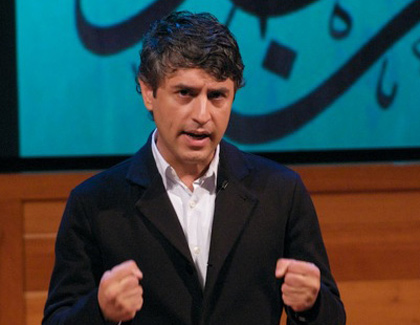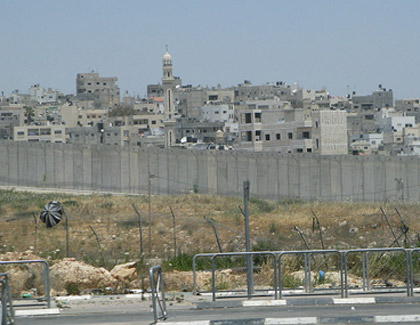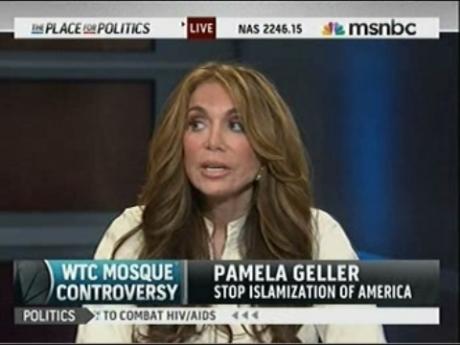
Reza Aslan.Photo courtesy of Reza Aslan.
In 1979, a seven-year-old Reza Aslan clutched his younger sister’s hand as he and his family ran through the airport, fleeing an Iran entering the peak of the Islamic Revolution. They planned to return soon, but after Ayatollah Khomeini’s hardliners consolidated power, their temporary exile became permanent in California. More than 30 years later, another revolutionary wave courses through the region. And Aslan, who’s since emerged as one of America’s leading commentators on the Middle East and Islam, likes what he sees. “Across the board, what has happened is that the regimes in the region now understand that they can no longer just ignore the will of the people,” he says.
Even as the Middle East’s latest revolutions chart a path very different from the one that forced Aslan from Iran, they’ve continued to spark his fascination with the intersection of religion and politics. Today, he’s as comfortable expounding on the theological fine points of Sufi mysticism as he is sparring with those he blasts as “pseudo-experts” peddling anti-Muslim “bullshit.” A professor of creative writing at the University of California at Riverside, Aslan is the consummate public intellectual. He has written or edited four books, including his recently rereleased 2005 bestseller No god but God, frequently appears on television and radio, and traverses the globe giving talks at universities, film festivals, synagogues, mosques, and churches. A few days ahead of his speaking engagement this Saturday evening at De Anza College outside San Jose, I talked to Aslan about Islamophobia, Al Qaeda’s role in igniting the Arab Spring, and the death of the two-state solution.
Mother Jones: You’ve argued that anti-Muslim sentiment in the US has gotten significantly worse of late, especially within the last few years. Why do you think that is?
Reza Aslan: This is the great irony of course. Despite the previous administration’s demonization of Islam, the truth is that in the United States during the early part of the Bush years, anti-Muslim sentiment was not nearly at the levels that it is today. Certainly there are a number of reasons for this, but as we now know, there has been a well-organized and deliberate attempt by a very small group of individuals, funded by a handful of foundations to the tune of 40 million dollars to convince Americans that Islam is the enemy.
MJ: You appeared on an ABC special in October called “Should Americans Fear Islam?” alongside Robert Spencer of the anti-Islam site Jihad Watch and Rev. Franklin Graham, who’s called Islam “wicked.” Why did you agree to do that?
RA: When Christiane [Amanpour] asked me to be on the show I said I would be happy to do so. Then a couple of days before the show, when they told me that one of the panelists was going to be Robert Spencer, and that Pamela Geller was going to be invited to speak, I said, “I’m out.” I have no interest in legitimizing these fringe individuals and organizations by pretending that they belong in a debate about Islam. As I said to Christiane, “If we were having a debate on race in America, would you invite members of the KKK?” And she not only withdrew the invitation to Pamela Geller, but she assured me that I would get an opportunity to really call Spencer on the bullshit that he peddles in the guise of academic research. He’s churning out these completely made-up statistics about how 80 percent of mosques in the US are preaching radicalism, whereas the fact-checkers and the producers and the reporters at ABC themselves on camera said that there are simply no research whatsoever that backs up that claim. But, next thing you know, here’s [Rep.] Peter King (R-N.Y.) in his discussions about why the US Congress needs to have hearings on the radicalization of American Muslims, and his reasoning was that 80 percent of mosques in the US are breeding radicalism. That gives you an understanding of how this Islamophobia industry works. You find a pseudo-scholar to make pseudo-scholarship claims, those claims get picked up by politicians and by Fox News, and they become part of the American dialogue about Islam.
MJ: A lot of people are referring to the Arab Spring as the bookend to the 9/11 decade. Is that how you look at it?
RA: That’s exactly how to look at it. The attacks of 9/11 were not really about us to begin with. What I mean by that is that like all acts of terrorism, their primary audience is not the same as their victims. We were the victims of 9/11. We weren’t the audience of 9/11. The audience was precisely the same young people who have risen up across North Africa and the Middle East to bring down these dictators. The entire purpose of the attacks of 9/11, as Al Qaeda ideologues have openly and unapologetically stated, was to rouse these young people, to get them to stand up to bring down their own governments, and to replace them with this radical conception of a global caliphate. Well, the odd thing about it is that it actually worked, somewhat. These kids were roused to action, but not because of Al Qaeda, but because of a different conception that through acts of nonviolence, through acts of democratic protest, they can accomplish in a few months what Al Qaeda has been trying to accomplish for decades.
MJ: Did Al Qaeda’s actions hasten the arrival of the Arab Spring?
RA: Absolutely. Let me put it this way. We talk a lot about how the Arab Spring represented a revolution in the way that social media and the internet was used. Well, who do you think pioneered that technology? Al Qaeda! It was Al Qaeda that first used the internet and social media to spread its message beyond borders and boundaries, to create a common identity based around a set of shared grievances and shared ideas. Al Qaeda was absolutely ingenious in their use of the internet to mobilize masses. And so, in a sense, the so-called Facebook Revolution really has Osama bin Laden to thank for its success.
MJ: Are you optimistic about the direction of the Arab Spring?
RA: My optimism rests in the confidence I have that the young people responsible for transforming the Middle East cannot be thwarted either by the remnants of regime loyalists like we’re seeing in a place like Egypt or the rise of Islamist groups like the Muslim Brotherhood. As a young kid in Egypt said quite famously after Mubarak fell, when asked whether he’s worried that the military won’t move forward on the reforms they’ve promised: “We know the way to Tahrir Square.” In a sense, the leaders of the region have been put on notice that the old ways of doing business no longer apply. That’s what the Arab Spring means. It’s not just about bringing down governments and setting up democracy. It’s about a firm recognition amongst all parties involved that this a region in which the people can no longer be ignored by their leaders.
MJ: Understandably, though, many people found the sight of crowds attacking the Israeli embassy in Cairo a couple weeks ago disconcerting.
RA: My take with regard to the political situation is that in some ways it’s inevitable. The peace deal between Israel and Egypt is not going anywhere. The military of Egypt is completely in charge of the peace process, and they’ve made it clear as can be that nothing is going to endanger that peace between the two countries. But one of the things I was saying about the aspiration of the people now mattering is that the Egyptian government can no longer turn the other way as the Israeli government continues to take away the rights of Palestinians, continues to occupy them militarily in the West Bank, and continues to snuff out any kind of nationalistic aspirations that the Palestinians legitimately have without hearing about it from their people. That to me is a good thing. So in a sense, the sort of fear and hysteria that immediately broke out in the US and in Israel when these kids foolishly and wrong-headedly attacked the Israeli embassy can ultimately lead to a far better situation.
MJ: President Obama came to office talking a lot about engaging countries like Iran and Syria. In light of recent events, that policy has been called into question. What’s the right balance between engaging these governments and promoting freedom, when the two can at times appear in conflict?
RA: First of all, let’s give Obama some credit here. His policy of engagement might have failed insofar as engagement did not lead to negotiations based on America’s best interest. Iran is still moving ahead on its nuclear project; Syria is still supporting Hezbollah. But that policy of engagement is what opened the door for the Arab Spring to be successful. Make no mistake: if George Bush were still president, Hosni Mubarak would still be in power. The argument that was made so often on the streets in Tunisia and Libya that this is just a Western conspiracy probably would have worked if anyone else except Barack Obama were in office. But because he had spent two years basically making it as clear as possible that the US no longer had the same expansionist agenda that it had under the Bush administration, the propaganda argument that this is all America’s doing simply did not work.
MJ: And how do you rate the president’s performance on Israel-Palestine?
RA: Barack Obama has been the single worst president in modern American history in dealing with the Israeli-Palestinian conflict. I will go so far as to say that his administration will go down in history as the administration that put a final definitive end to the possibility of a peace process and the possibility of a two-state solution. It will be on Barack Obama’s watch, and as a direct result of his actions, that we will say years from now that the two-state solution came and went. That’s the catastrophe that has resulted from Obama’s Middle East policy. The worst of any president, including George W. Bush.
MJ: How so?
RA: At least with Bush you knew what you were getting. Bush’s policy with regard to the Israeli-Palestinian conflict was as clear as it gets. Israel can do whatever it wants, whenever it wants. So then, when George Bush was the first president to actually say the words “Palestinian state” in a sentence, that was a huge turnaround. But for President Obama to come into office promising a more evenhanded approach to the conflict, and then to not offer a single new policy position, not a single new framework, nothing new, nothing unique, save an absurd overconfidence about how he’s going to have a peace process settled within the first year of his administration, was in and of itself disastrous.
MJ: If the two-state solution is dead, what comes next?
RA: I think Ehud Barak, the defense minister of Israel summed it up perfectly, as did Ehud Olmert, the former prime minister: What comes next is either the end of the Israeli government, or apartheid, or ethnic cleansing. This isn’t a notion that is new to Israelis. I have spent many, many trips in Israel, and almost everyone says the same thing: that the demographic situation in Israel is such that if there is not a stable Palestinian state in the next few years, the Jewish majority in Israel will cease to exist. At that point Israel will have to decide: Is it a Jewish state or a democracy? Because it cannot be both. That is to me a tragedy. I am an ardent supporter of Israel. I believe in Israel’s right to exist as much as I believe in the right of a Palestinian state to exist. But when I talk to Palestinian militants, particularly those aligned with Hamas, they say very clearly: “All we have to do is wait another decade or two and all that you see here will be called Palestine.” And they’re right. America’s blind acceptance of Israeli policy, its blind support of Israel, and the current Israeli government’s hard-line policies against a two-state solution—that is the State of Israel committing collective suicide.














